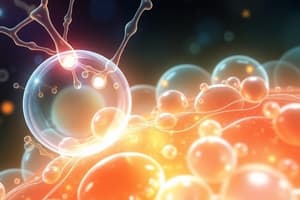Podcast
Questions and Answers
What is the primary function of the cell membrane?
What is the primary function of the cell membrane?
- Controls what enters and leaves the cell (correct)
- Produces proteins for the cell
- Provides structure and support to the cell
- Suspends organelles within the cell
Which of the following organelles is found in all types of cells?
Which of the following organelles is found in all types of cells?
- Nucleus
- Cytoskeleton
- Ribosomes (correct)
- Mitochondria
What is the role of the cytoskeleton in eukaryotic cells?
What is the role of the cytoskeleton in eukaryotic cells?
- To maintain cell shape and assist in organelle movement (correct)
- To produce energy for the cell
- To perform photosynthesis
- To transport molecules across the membrane
Which of the following statements is true regarding ribosomes?
Which of the following statements is true regarding ribosomes?
Which organelles are considered membrane-bound and exclusive to eukaryotic cells?
Which organelles are considered membrane-bound and exclusive to eukaryotic cells?
What is the primary function of the Golgi apparatus?
What is the primary function of the Golgi apparatus?
Which structure is specifically involved in protein synthesis and is characterized by the presence of ribosomes?
Which structure is specifically involved in protein synthesis and is characterized by the presence of ribosomes?
Which organelle is responsible for detoxifying certain substances within the cell?
Which organelle is responsible for detoxifying certain substances within the cell?
What is the function of chloroplasts in plant cells?
What is the function of chloroplasts in plant cells?
Which of the following is true about lysosomes?
Which of the following is true about lysosomes?
Which organelle is unique to animal cells and assists in cell division?
Which organelle is unique to animal cells and assists in cell division?
What role does the vacuole play in plant cells?
What role does the vacuole play in plant cells?
Where is DNA primarily stored within a eukaryotic cell?
Where is DNA primarily stored within a eukaryotic cell?
Flashcards are hidden until you start studying
Study Notes
Cell Membrane
- Also known as the plasma membrane
- Found in all cells, including prokaryotic and eukaryotic cells (both plant and animal).
- Maintains homeostasis by controlling what enters and leaves the cell.
Cytoplasm
- Gel-like substance inside the cell.
- Found in all cells, including prokaryotic and eukaryotic cells (both plant and animal)
- Suspends the organelles and provides an environment for chemical reactions within the cell.
Ribosomes
- Found in all cells, including prokaryotic and eukaryotic cells (both plant and animal).
- Located floating in the cytoplasm and on the endoplasmic reticulum (ER).
- Make proteins.
Cytoskeleton
- Network of proteins found throughout the cell.
- Found in eukaryotic cells (both plant and animal).
- Provides structure for cells and movement of organelles.
Nucleus
- Surrounded by a nuclear membrane.
- Found in eukaryotic cells (both plant and animal).
- Stores genetic information (DNA).
- Contains the nucleolus, which makes ribosomes.
Rough Endoplasmic Reticulum (ER)
- Called "rough" because of ribosomes attached to it.
- Found in all eukaryotic cells (both plant and animal).
- Makes and transports proteins.
Smooth Endoplasmic Reticulum (ER)
- Found in all eukaryotic cells (both plant and animal).
- Makes lipids and membranes.
- Detoxifies substances in the liver.
- Stores calcium in muscle cells.
Golgi Bodies (Golgi Apparatus)
- Found in all eukaryotic cells (both plant and animal).
- Modifies, sorts, and ships proteins.
- Can send proteins to other places within the cell or out of the cell.
Mitochondria
- Singular form: mitochondrion.
- Found in all eukaryotic cells (both plant and animal).
- Creates energy (ATP) from food.
- Site of cellular respiration.
Vacuole
- Found in all eukaryotic cells (both plant and animal).
- Stores food, water, or wastes within the cell.
- Plant cells have a large central vacuole, which we will discuss later.
Lysosome
- Found primarily in animal cells.
- Uses enzymes to digest bacteria, viruses, and old organelles.
- Recyles old cell parts.
Centrosome
- Contains centrioles.
- Found only in animal cells.
- Creates spindle fibers used in cell division.
Cell Wall
- Rigid structure outside of the cell membrane.
- Found in plant cells, prokaryotic cells, fungi, and algae.
- Provides shape, structure, and protection for the cell.
Chloroplast
- Found in plant cells and other photosynthetic eukaryotes (algae).
- Site of photosynthesis.
- Uses the sun's energy to produce food.
Central Vacuole
- Found in plant cells.
- Stores water to maintain plant shape.
- Explains why plants wilt when they need water.
Studying That Suits You
Use AI to generate personalized quizzes and flashcards to suit your learning preferences.



